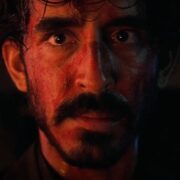The History of Hong Kong Action Cinema Pt. 6 – 1980-2000: Handover & Second Wave
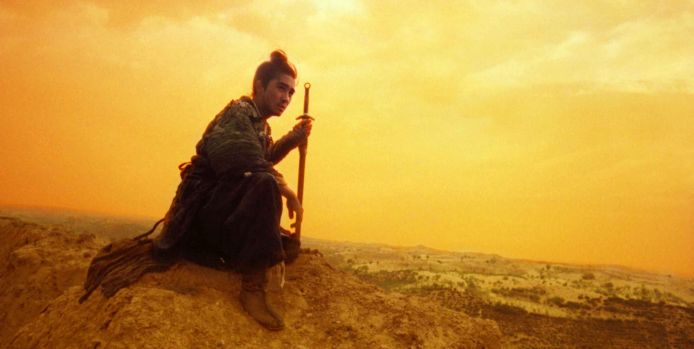
Massive film lover. Whether it's classic, contemporary, foreign, domestic, art,…
The 1980’s through the years leading up the handover in 1997 were paramount in Hong Kong’s long-running series of action films. They have yielded some of the best titles to have emerged from the crown colony as it was in this era. The very words “Hong Kong” at this point in time stirs up images of hit men wielding two handguns, flying swordsmen, and an endless array of bright neon lights. Action and art were coming together and the second wave brought the film business in Hong Kong to exciting and dazzling new heights. The 1980’s introduced us to a more artful side of Hong Kong, while on the other hand the wuxia genre reached new heights of kinetic inspired lunacy.
Hong Kong’s Second Wave
Like the Hong Kong New Wave that had taken place nearly twenty years earlier, The Hong Kong Second Wave was made up of an amalgam of great directors. Wong Kar-wai and Fruit Chan took their cameras to the streets and made artistic films for nearly no money with mostly unprofessional actors. Their most significant works were focusing mainly on lower class Hong Kongers and their wavering fears regarding the handover of 1997.
At this time, people felt that Hong Kong film was in decline, and filmmakers were less concerned with commercial success and more so with societal issues. This was a generation of filmmakers who, unlike their forefathers, spent a lifetime growing up in a colonized city; they were familiar with their Chinese heritage, yet their upbringing was in a British leased crown colony. These filmmakers brought a street smart vitality to Hong Kong’s film industry, with an artful air that paired well with the edgy material covered by Wong Kar-wai and Fruit Chan.
Focusing on a trio of misfit youths whose leader Moon is loosely connected with a local Triad gang. Made in Hong Kong is a low key, no-budget masterpiece. Allegedly shot on expired film from Andy Lau’s film company Teamwork Productions, Made in Hong Kong doesn’t offer a plot-heavy story, but more of a street born fever dream about the unwinding of three youth’s throughout the course of a few months. They’re aimless, yet sincere and therefore, likable, even if they’re delinquents. The story is free flowing, and the film relies heavily on Moons narration that works to great effect.
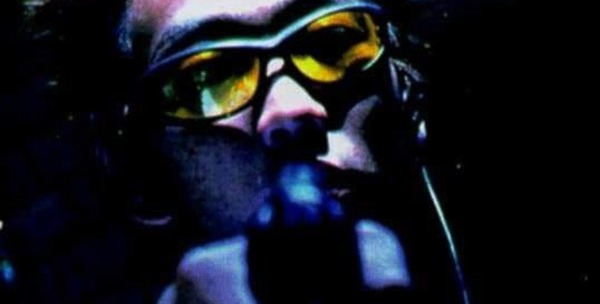
Fruit Chan’ s followup to Made in Hong Kong is the equally raw, and even more ambitious film The Longest Summer. Fruit Chan’s first two films embody the spirit of new wave aesthetics and neo-realism. Employing the location of Hong Kong for its set, using amateur actors, the freewheeling cinematography and direction with the intent of conveying a social/political message, both films succeed above and beyond. After years of turning out commercially digestible genre pictures, Hong Kong had a growing collection of truly artistic filmmakers emerging from the woodwork.
Second Wave Masterclass – The Cinema of Wong Kar-wai
In 1988, Wong Kar-wai broke into the Hong Kong cinema scene with his debut As Tears Go By, followed by his classic Days of Being Wild. Wong Kar-wai is considered a fully certified auteur and rightfully so. His meditative studies of Hong Kong life, and the fleeting nature of love in a homogenized urban cityscape, are often told by detached narrations, the dizzying neon streets of Hong Kong brilliantly captured by longtime cinematographer Christopher Doyle. Wong Kar-wai’s films breathed new life into a market that was saturated in cliche and commercialism. His follow-up Days of Being Wild, (easily one of his best works) bears all the marks of the auteur’s style, it’s a beautifully sad meditation on life. Ashes of Time, known as one of his hardest productions, also gave way to one of his more popular films, Chungking Express.
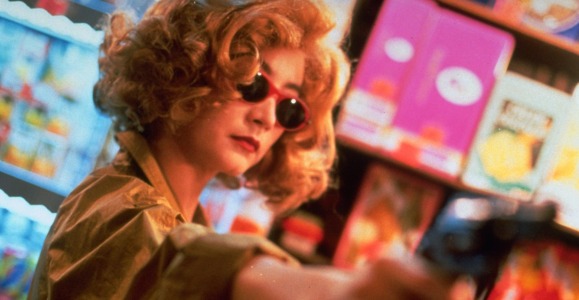
The editing of Ashes of Time proved to be too daunting, and to exorcise his creative itch, Wong Kar-wai cranked out the very entertaining and free-wheeling Chungking Express. The two films couldn’t be more different in style and tone but are almost companion pieces if you consider their chronology and cast. Ashes of Time has an odd place for fans of the director; those who are fans of the traditional wuxia films are put off by its narrative and gritty style, while fans of Wong Kar-wai’s other films don’t gravitate to the action sequences. Although the only version of the film available in the U.S. is the director preferred “redux”, the original Hong Kong edit is in my opinion a superior film.
Great casting, and writing (by the director, who is credited as a writer on all his films), and cinematography Christopher Doyle make Wong’s films truly unique, his films don’t just have style but a life of their own.
Wild Action Gets Crazy – Ching Siu-tung & Tsui Hark
Another key figure in the creative bombardment of 80’s Hong Kong cinema was Ching Siu-tung. The partnership of Tsui Hark and Ching Siu-tung would lead to some of the wildest films from Hong Kong’s pre-handover (or post-handover for that matter) era. His debut feature as director, A Duel to the Death, is non-stop action: from start to finish the film is a grab bag of hyper-kinetic fighting and action.
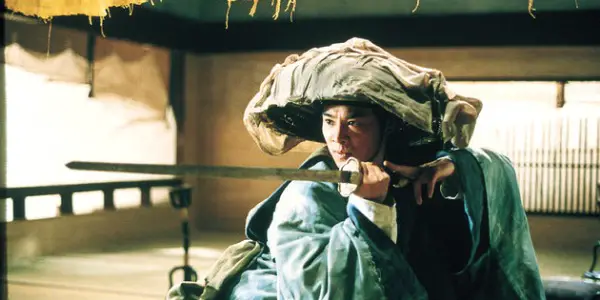
A Duel to the Death is a great film if you don’t mind frenzied martial arts violence, however, it wasn’t until he began directing films for Tsui Hark that his reputation and career took off. In 1987, Ching Siu-tung would direct the classic Chinese Ghost Story for Cinema City and the film was a huge success and is continually remembered as a classic Hong Kong film. Followed by two sequels (that are wilder than the first film) A Chinese Ghost Story is a manic construction of horror, comedy, action, romance, fantasy and musical; in the hands of Ching Siu-tung, and Tsui Hark the results are perfect and unlike anything ever made.
The sequels that followed were just as wild; filled with giant tongues, flying vampires, and occasional moments or genuine romance. Ching Siu-tung and Tsui Hark had created a winning formula and their subsequent films, The Raid (1991), Swordsman, Swordsman II, The East is Red (aka Swordsman 3) retained the same madcap energy that made Chines Ghost Story so successful. Most importantly, these movies are distinctly cultural, playing on themes that are directly drawn from Chinese folklore abundance of eye-popping action and visuals.
The atmosphere and flavor of these films are what make the otherwise silly material such a pleasure to watch. This sub-genre of supernatural kung-fu films seems to have vanished in the post handover landscape of Hong Kong films. Sadly, this style of filmmaking has all but disappeared from the public over the years. And after the decline of Cinema City the countdown to the Handover was only a few years away, which as a result would have a tremendous effect on the film industry of Hong Kong.
At this point in Hong Kong, Tsui Hark, John Woo, Ching Siu Tung, Ringo Lam, Ronny Yu, Sammo Hung, Jackie Chan, and Johnnie To transformed the film industry from costume dramas and Cantonese opera into their own amalgam of stylistic diversity. Tsui Hark and Ching Siu Tung made wildly energetic wuxia ghost stories, John Woo had such a devoted following and star status as a director he was eventually lured into Hollywood (along with Tsui Hark) for a few less than memorable titles they’d direct. Ringo Lam’s sobering social drama’s and action films were a refreshing counterpoint to the work of his contemporaries, Ronny Yu went from making ghost comedies for Cinema City to his greatest achievement with his 1993 classic: Bride With White Hair.
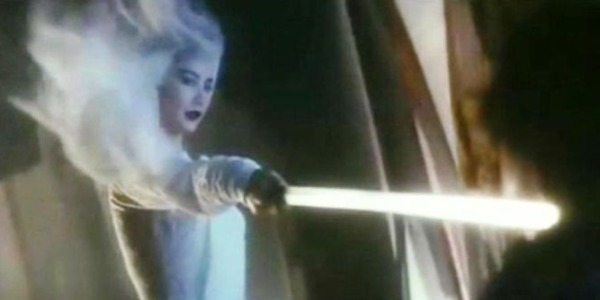
Ronny Yu blends flying swordsman, witchcraft, Shakespearean romance and hallucinatory images in what would become one of the most distinctive blend of sorcery and martial arts. A staple title with great performances from Brigitte Lin (in the titular role) and Leslie Cheung as the brooding chivalrous swordsman. The cinematography and fight scenes are extraordinary, and the film is a consistent reference point for fans of Hong Kong cinema.
The Continuing Rise Of Jackie Chan
Consistently popular, and always working on his life in film Jackie Chan continued to be a dominant force in Hong Kong. Jackie Chan’s mercurial rise to fame was a no-brainer, and his departure from Hong Kong to make films in the U.S. wasn’t unexpected. Although his collaboration with his childhood friends, known as the “Three Brothers” Jackie Chan, Sammo Hung, and Yuen Biao were some of his best films they made for all of their careers.
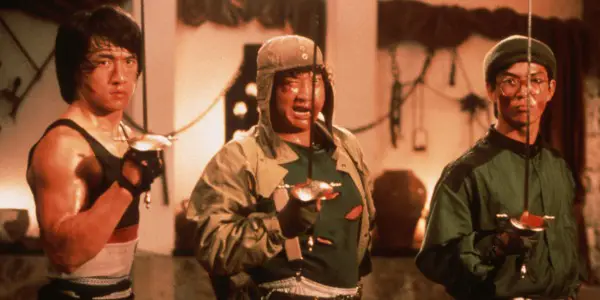
By 1987 their arguably greatest collaboration Dragons Forever was revved up to be a hit as it starred the three brothers, and was scheduled to be released on The Chinese New Year. But the production proved to be a strain on all three of its stars, Jackie and Sammo quarreled over the fight choreography, and Yuen Biao who receives the least amount of screen time justifiably felt left out. Dragons Forever features great fight scenes and death defying stunts, but it was the last time the three brothers would work together.
Both Sammo Hung and Yuen Biao continued working in Hong Kong and proved that they could independently carry their own films independent of Jackie Chan. Yuen Biao’s Above the Law (aka Righting Wrongs) is a lively action film, as well as The Kid from Tibet, a successful vehicle he starred and directed. Sammo Hung made a name for himself as “the fastest fat man in the world” a title that he’s earned through many hit films, including Pedicab Driver, Painted Faces, and recently in hit films like Ip Man, and Once Upon a Time in Shanghai.
An Uncertain Future for Hong Kong Cinema
At this time Tsui Hark, John Woo, Ronny Yu, Jackie Chan, and Ringo Lam set out for work in America as the handover threatened the once thriving Hong Kong film industry. Why did all of the premier directors leave at this time? Was it their fame, making them profitable interests for Hollywood? Or did these directors leave their native land given the impending handover that was looming on the horizon? The 1997 handover of Hong Kong to mainland China was a major concern for everyone, especially those in the movie business.
The years following would be rocky, and the handover in 1997 would be a major change for all of Hong Kong as well as the film industry. But that topic needs its own section to be properly explored, and will be in the next segment.
Thanks for reading and join us next part of the series!
(top image: Ashes of Time (1994) – source: HKFM)
Does content like this matter to you?
Become a Member and support film journalism. Unlock access to all of Film Inquiry`s great articles. Join a community of like-minded readers who are passionate about cinema - get access to our private members Network, give back to independent filmmakers, and more.
Massive film lover. Whether it's classic, contemporary, foreign, domestic, art, or entertainment; movies of every kind have something to say. And there is something to say about every movie.












